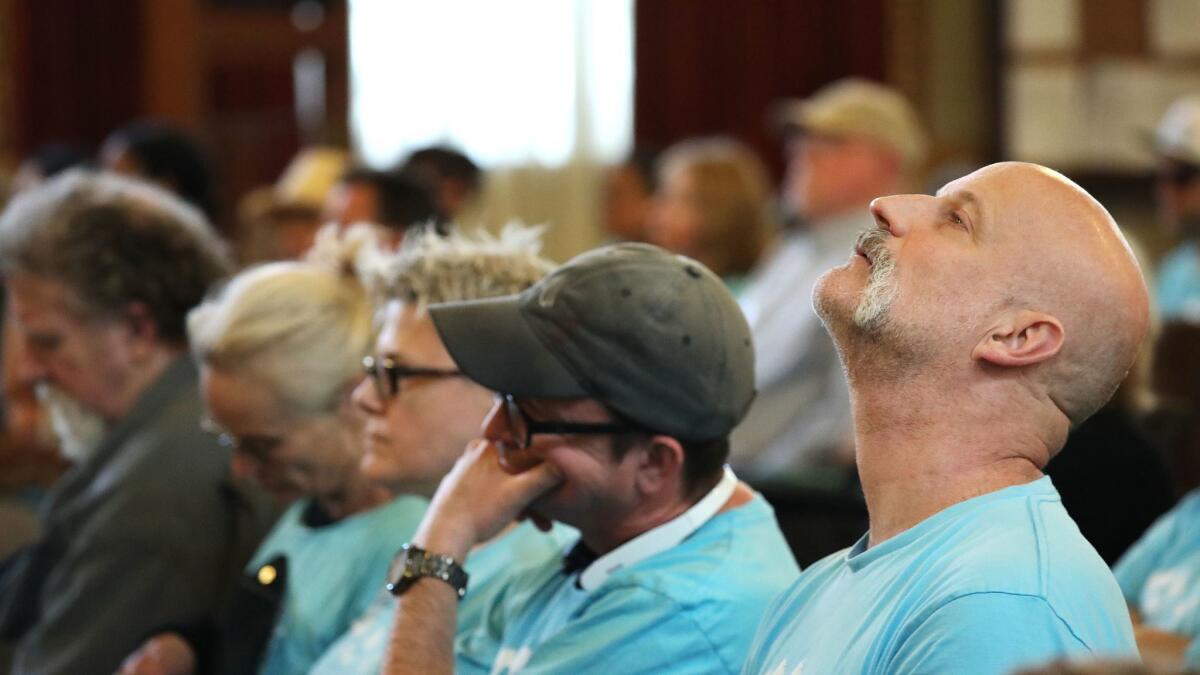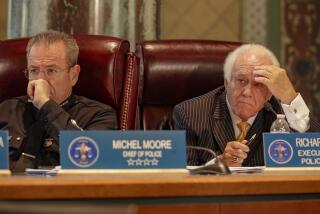Want to Airbnb your home for the bulk of the year? L.A. might let you — on a case-by-case basis

Los Angeles residents who want to rent out their homes for short stays for the bulk of the year would have to get case-by-case approval from the city under a new proposal being explored by city lawmakers.
A Los Angeles City Council committee asked staffers Tuesday to come back in a month with more information on the idea, including possible fees and requirements.
For more than two years, city officials have been wrestling with how to legalize and regulate the popular practice of renting out rooms or entire homes for short stays. Planning officials say it is currently illegal in many residential areas, but those rules have rarely been enforced amid the rise of online platforms such as Airbnb that link travelers to hosts.
Airbnb and its hosts say that night-to-night rentals provide a vital way for people to make ends meet, bring tourist spending to new neighborhoods and pump more tax revenue into the city budget. Airbnb has already brokered an agreement with the city to collect and pass along lodging taxes from its hosts, providing L.A. more than $42 million last year.
Housing activists, neighborhood groups and the hotel industry, in turn, say the city needs to prevent apartments and houses from being rented out constantly to a revolving door of visitors, arguing that it disrupts neighborhoods and exacerbates the housing crisis. Many said they were irritated by the years of city inaction.
At Tuesday’s hearing, Councilman Jose Huizar said he hoped that lawmakers would decide on a set of proposed regulations the next time they came before his committee, then pass them along to the whole council for its approval.
The proposed rules being vetted at City Hall would legalize such rentals but impose some restrictions: Los Angeles would allow hosts to rent out only their “primary residence” for short stays. Hosts would have to register with the city or face fines for advertising illegal rentals. And they would be barred from hosting night-to-night rentals in homes that fall under rent stabilization rules.
Much of the debate at City Hall has revolved around whether the city should cap the number of nights that people can rent out their home to travelers every year. Housing activists argue that a strict limit would eliminate a financial incentive to convert homes into “de facto hotels” that bring in more money.
But some hosts have bristled at the idea of a cap, arguing that it would be a financial hardship for people who rely on Airbnb rentals to cover their mortgage or other expenses. Some argue that their rentals do not take any housing off the market, because they are offering rooms that would not otherwise be available to longstanding tenants.
Planning officials had initially recommended an annual cap of 90 days across the city, and later revised its recommendation to 120 days. The Planning Commission, whose members are appointed by Mayor Eric Garcetti, instead suggested capping short-term rentals at 180 nights annually.
After a string of hearings at City Hall, a council committee has yet to decide on that cap. But at the Tuesday hearing, lawmakers said they wanted to explore options for allowing hosts to exceed such a cap on a case-by-case basis, using some kind of process that could include public hearings, neighbor notification and appeals.
In a recent report, planning officials had questioned that idea, warning that even if only a fraction of Airbnb hosts seek city permission to exceed an annual cap, those applications could swamp the department and require more staff to process them.
But the idea appears to have tentative support among council members. Councilman Bob Blumenfield, a member of the committee that held Tuesday’s hearing, suggested that the city could consider imposing a lower cap than previously suggested — possibly 120 days annually — while allowing people to exceed it if they went through a new approval process.
If the city creates such a process, “we obviously we do not want to make it a burdensome one,” Huizar said.
Both sides of the longstanding debate are closely eyeing how such a process would work. John Choi, Southern California public policy manager for Airbnb, said the company wants to make sure any approval process is “manageable” for its hosts, but was hopeful that it could ensure that “responsible hosts who follow the rules have an opportunity to make ends meet.”
Critics of “commercialized” short-term rentals say they are also open to the idea, although they want the cap to be much stricter than Airbnb and its hosts have suggested.
Judith Goldman, one of the co-founders of the advocacy group Keep Neighborhoods First, said she wants the city to carefully vet anyone who wants to rent out their home for more than 90 days annually.
Twitter: @AlpertReyes
More to Read
Sign up for Essential California
The most important California stories and recommendations in your inbox every morning.
You may occasionally receive promotional content from the Los Angeles Times.











